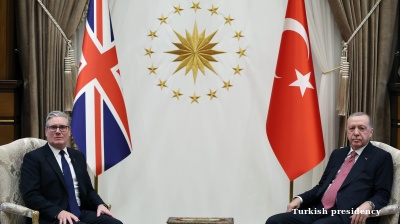Post-Assad Syria will never allow its territory to be used as a staging ground for threats against Turkey, its top diplomat said on January 16 after talks in Ankara. The commitment was a clear reference to Syrian Kurdish forces who, to Turkey’s ire, continue to hold sway over much of northeastern Syria.
"The new administration will not allow Syrian territory to be used as a launchpad to threaten Turkey and the Turkish people. We will work on removing these threats," said Asaad al-Shaibani, following discussions with Turkish counterpart Hakan Fidan.
Shaibani is the appointed foreign minister of the new administration that has emerged in Damascus since the sudden December downfall of former Syrian president of nearly 25 years, Bashar al-Assad, sparked by a Turkey-endorsed offensive led by Islamist militia Hay'at Tahrir al-Sham (HTS).
A difficulty for Nato member Turkey is that the Kurdish-led Syrian Democratic Forces (SDF) in northeastern Syria remain allied with the US. It’s a standing earned by the essential ground forces role they played for Washington six years ago in bringing down the self-declared caliphate that was created by the Islamic State (ISIS) terrorist group acrosse swathes of Syria and Iraq. Ankara, however, makes little distinction between the SDF and the Kurdistan Workers’ Party (PKK), which has waged an armed insurgency against Turkey since 1984 and is routinely described as “terrorist” by Turkish officials.
Since Assad fled to Moscow amid the collapse of his regime, Turkey has been threatening to launch a large-scale incursion into Syria in order to carry out a military operation aimed at destroying the SDF. The threats have prompted a flurry of US-led diplomatic efforts to head off any such confrontation, but the approach that Donald Trump will take to the situation after he returns to the White House as US president on January 20 is not yet known.
"We thank Turkey for trusting the new administration to address the source of these threats. We are now working to solve these issues through negotiation and dialogue, and expect to see reach tangible results in the very near future," he added.
The SDF, which controls an autonomous Kurdish region in the northeast, has said that it does not want to break away from the rest of Syria, and Shaibani said the northeastern area would have to come under Damascus's control.
"There is no longer a justification for the presence of the SDF in their current form... in northeastern Syria," he said. "We must work to bring back the Arab tribes and return the region to the central government."
The SDF commander in Syria, Mazloum Abdi, said in an interview on December 19 that Kurdish fighters who came from around the Middle East to fight for his militia in Syria would leave the country if Turkey agreed a total ceasefire on clashes taking place in northern and northeastern Syria.
"There is a different situation in Syria [following the fall of the Assad regime], we are now starting a political stage. Syrians must solve their problems themselves and establish a new administration," Abdi told Reuters.
He also said: "We are now preparing, after a total ceasefire between us and the Turkish forces and their affiliated factions, to join this stage.
"Because there are new developments in Syria, it is time for the fighters who helped us in our war to return to their areas with their heads held high."
The SDF still controls dozens of prisons and camps where thousands of Islamic State and other fighters from various militia are held.
Also on January 16, Reuters reported a PKK official as saying that the group would agree to leave northeastern Syria if the SDF maintained a significant joint leadership role there.
"Any initiative resulting in the governance of northeastern Syria under the control of the SDF, or in which they have a significant role in joint leadership, will lead us to agree to leave the region," the official at the group's political office in northern Iraq, where the PKK is headquartered, was quoted as saying.
Turkey has informed Damascus that it would be prepared to help in the fight against Islamic State jihadist fighters still active in Syria and also run the prisons currently overseen by the SDS that contain many Islamic State militiamen.
"We told them we are ready to provide operational support in the fight against Islamic State, we've taken some steps in this regard in the last few days," Fidan added, referring to "intelligence sharing and developing military capabilities".
Earlier, Turkish President Recep Tayyip Erdogan said Turkey was the best option for fighting the jihadists.
"If the ISIS threat is truly feared in the region, Turkey is the greatest power with the will and strength to solve this issue," he said.
The Syrian delegation that visited Ankara included Defence Minister Murhaf Abu Qasra, who met with his Turkish counterpart Yasar Guler, and spy chief Anas Khattab, who held talks with Turkey's intelligence boss Ibrahim Kalin.
News
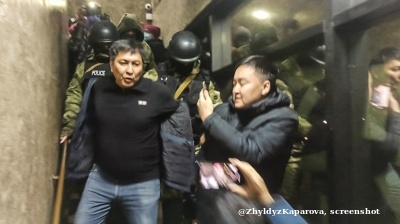
Kyrgyzstan bans three media titles as “extremist organisations”
Populist-nationalist president Sadyr Japarov, due to meet Donald Trump next week, denies introducing authoritarian controls.

Lula says Trump assured him of trade accord as US explores Brazil rare earths ties
Brazilian President Lula voiced optimism that his country will secure a trade agreement with the US following talks with President Trump, as Washington simultaneously stepped up engagement with Brazilian mining executives to discuss rare earths.
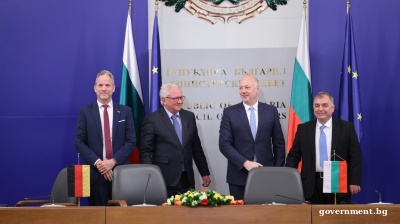
Bulgaria signs landmark deal with Rheinmetall to build ammunition plant
Investment reflects Bulgaria’s growing role in Europe’s rearmament drive and Nato’s efforts to strengthen regional defence supply chains and cut reliance on external suppliers.
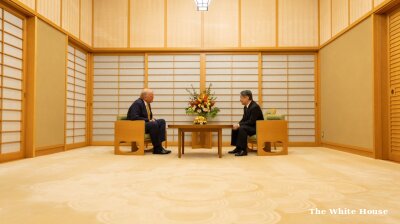
US-China trade talks deliver breakthrough as markets rally ahead of Trump-Xi meeting at APEC
How and if China will react to a US-Japan rare earths deal remains to be seen but Beijing has said it will suspend its restrictions on rare earth metal exports in what is a move likely to ease pressure on the US tech and defence sectors.
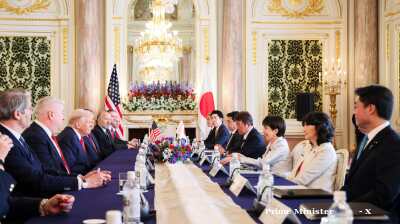
_1.jpg)
